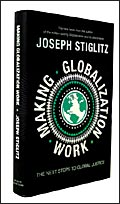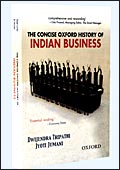 |
MAKING GLOBALIZATION
WORK
By Joseph Stiglitz
W.W. Norton
Pp: 358
Price: Rs 595 |
Joseph
Stiglitz takes to the globalisation pulpit with a missionary zeal.
Making Globalization Work, his latest offering on the subject,
is truly an endeavour in that direction. His prescriptions on
the variety of vexed issues, while reflective of his untiring
commitment to drive home equity in the globalisation process,
border on the impractical. His theme is simple-the developed countries
ought to give more to the developing countries in every sense.
His solutions are radical. He condemns the prevailing patent regime
as one that breeds monopolies, stifles research rather than promotes
it, and at the end of the day, fattens the pockets of multinationals
in developed countries. Stiglitz suggests measures like committed
bulk procurement of medicines by global agencies to address the
genuine issue of recouping research costs of pharmaceutical companies.
To save the environment, he suggests that
countries levy a pollution tax at the consumption end that will
provide a baseline for setting country-level emission reduction
targets. On the corporate front, the book brings out the pitfalls
of Limited Liability Partnership-they are often used to renege
on contracts, since liabilities are limited to the extent of participation
in the partnership-and possible solutions. Here, and on several
other issues, a good part of his solutions involve the creation
of global institutions that are insulated from the prejudices
of the developed countries. Surely, such solutions have no feet
to stand on, at least for the foreseeable future.
Stiglitz spares no opportunity in exposing
the hypocrisy of the American system. It deems it fit to send
the WorldCom CEO behind bars for 100 years on charges of cheating
the American public, but does not think it right to extradite
the CEEO of Union Carbide, a company responsible for thousands
of deaths in Bhopal. The book is sprinkled with several such instances.
Inequities are equally perpetuated in the
more impersonal world of state finances, says Stiglitz. Making
a case for liberal lending terms and debt forgiveness by IMF and
World Bank, the author argues that bankruptcy of a state and that
of a corporate cannot be treated alike, for in the case of the
latter, assets can be taken over. Moreover, he points out that
the lending policies are formulated by the developed countries
with the primary objective of securing the lenders' interests.
Clearly, on this count, there are strong arguments on both sides
of the fence.
That the legacy in global trade talks will
not be easy to overcome is well known. Stiglitz's solutions, heartening
as they sound, are unlikely to find an ear in the relevant quarters
to make it work. Amen.
 |
THE CONCISE OXFORD
HISTORY OF INDIAN BUSINESS
By Dwijendra Tripathi and Jyoti Jumani
Oxford
Pp: 265
Price: Rs 275 |
By now, Dwijendra Tripathi
has come to be recognised as the most authoritative business historian
in India. So, it's no surprise that his concise history of Indian
business is actually a comprehensive look at the evolution of
Indian business since the 1700s. It is to Tripathi's credit that
he doesn't merely chronicle the times gone by, but also looks
at available evidence to draw conclusions not always made by European
chroniclers. For instance, 'conventional' business history would
have us believe that Indian traders were mere peddlers when the
Britons first came to India. But Tripathi, a former professor
of business history at the Indian Institute of Management Ahmedabad,
argues that was far from the case. "The association of merchants
representing different trades that existed in many cities would
have been wholly unnecessary if the number of participants in
these trades was not sufficiently large," the authors write.
Tripathi, who has authored several other books on Indian business
and business communities, also contends that the Indian traders'
inability to move from trade to industry wasn't due to some social
or cultural reasons as commonly believed, but due to the lack
of an enabling environment. Anyone who wants to understand the
evolution of business in India will find the book an excellent
starting point.
|






